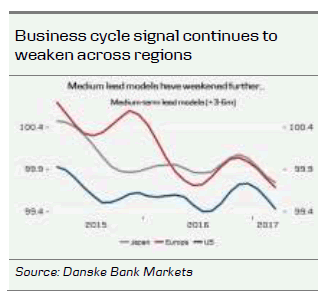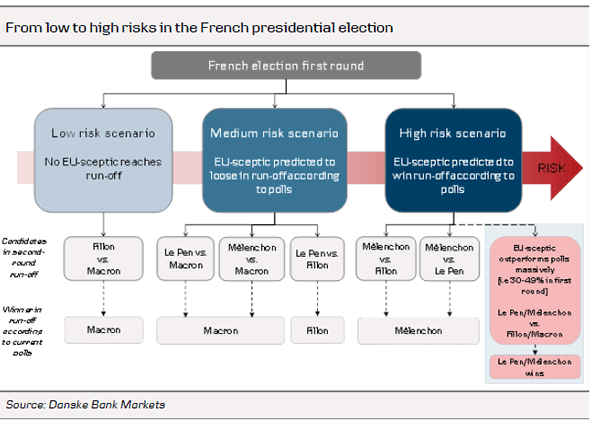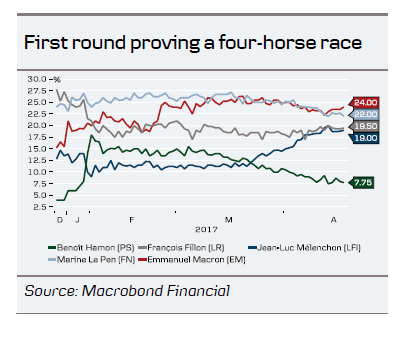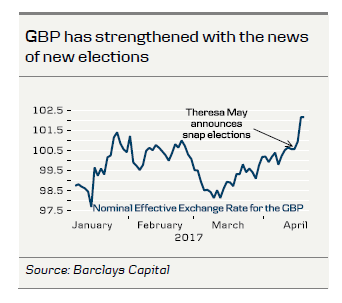Key points
- Elections in Europe come against the backdrop of the global business cycle looking to lose momentum.
- First round of French presidential elections too close to call.
- Relief rally expected if mainstream candidates go to second round.
- A run-off between Marine Le Pen and Jean-Luc Mélenchon cannot be precluded and could set off a major market correction.
- The UK election is likely to strengthen Theresa May’s hand in the upcoming Brexit negotiations
This week is dominated by political headlines in Europe. The first round of the French presidential election is upon us on Sunday. It has been awaited (or feared) for months, or basically since last year’s surprise Brexit outcome and Donald Trump’s victory, which served as a reminder that populist movements are taking hold in western politics. Also, as if the political calendar was not crowded enough already, UK Prime Minister Theresa May has called a general election for 8 June. In the midst of this frantic European political calendar, economic data releases and central bank views are almost taking a backseat to political events. Hence, the title of our FX Forecast Update this week: Political risks are in charge. However, before turning to the likely outcome and market implications of these key political events, it is worth taking a look at our latest take on the global business cycle.
Our global business cycle model points to weakening growth momentum ahead
Our leading macroeconomic model MacroScope this week pointed to further weakening momentum in the global business cycle in the period ahead. The model paints a picture of the underlying macro environment on a three- to six-months horizon. While the underlying macro environment is getting more bullish, the market has already rallied and is in neutral to slightly overbought territory now. This points to a rising risk that we are moving into a scenario that tends to entail more frequent corrections in risk markets. In other words, the sensitivity to external shocks such as perceived adverse political events will increase


Stakes are high and outcomes unpredictable ahead of first round of the French presidential election
Although Macron seems set to be the likely winner of the French presidential elections, none of the leading four candidates can be written off at this time. The race between the four leading candidates Marine Le Pen, Emmanuel Macron, François Fillon and Jean-Luc Mélenchon has narrowed over the past month and the outcome is likely to be tight (see French Election Monitor No. 3: Markets hold their breath as first election round draws near, 21 April). Also, the terror event in Paris last night may swing some voters towards Le Pen. Recent weeks have seen a surge in the polls of the far left-wing candidate after a strong performance in the TV debates. Although a run-off on 7 May between Le Pen and Macron still seems to be the most likely outcome according to the polls, the other two major candidates cannot be written off, especially as almost a quarter of the voters are still undecided and the turnout is expected to be low due to widespread dissatisfaction with the established political class. Also, as we know from last year’s elections, some caution should be taken with regard to polls.
The different election outcomes could have widespread implications for France and the EU more generally. Both Mélenchon and Le Pen share a similar EU-sceptic and antiglobalisation stance. Mélenchon wishes to renegotiate EU treaties and hold a subsequent EU referendum on the result as well as ending the independence of the ECB. Both candidates support expansionary fiscal policies with little regard to the EU deficit rules. They also liken a ‘France-first’ to public procurement and investment policies. On the other hand, a victory by Fillon and to some extent Macron would be likely to be followed by a reform drive in the French economy and the EU more generally.
We have divided the range of possible outcomes into three scenarios: a ‘low-risk’ scenario entailing no EU-sceptic candidates making it to the second round; a ‘mediumterm’ risk scenario where an EU-sceptic candidate makes it to the second round but an established candidate looks likely to be the winner; and a ‘high-risk’ scenario, where Le Pen and Mélenchon face each other in the second round or if one of them receives much stronger than expected support in the first round (30-49% of the votes), increasing the chances that they will beat either Macron or Fillon in the second round.
What is the initial market reaction following the first round likely to be? In the ‘lowrisk’ scenario, we will probably see a relief rally, sending equities and the EUR up, while fixed income markets would be likely to see some sell-off. In the ‘medium-risk’ scenario, we expect the market reaction to be fairly modest, as markets are most likely positioned for this already. However, in the high-risk scenario, we may easily see a sharp equity market sell-off given possible ramifications for the French economy and the EU as well as the euro. We think there will be a sell-off in French government bonds. We see the EUR/USD falling to the lower part of the current range of 1.04-1.10 in this scenario.


UK election likely to strengthen Theresa May’s hand in the upcoming Brexit negotiations
The surprise of the week was the decision by UK Prime Minister Theresa May to call snap elections scheduled for 8 June. This move is no doubt an attempt to strengthen her powers both within and outside the conservative party, as the polls point to a solid victory for the Conservative Party. Such a victory, increasing the party’s majority in parliament beyond the current 330 seats (32 seats required for majority), would make her less vulnerable during the upcoming Brexit negotiations to the threat from fractions within the Conservative Party that either want a tougher line in the Brexit negotiations (e.g. UKIP) or seeking to soften terms or even to reverse the Brexit decision. Such a scenario is by no means guaranteed, as the Conservative Party may fail to clinch as strong a victory as expected (leaving a status quo situation) or we could even see Labour, the Liberal Democrats and possibly the SNP forming some sort of a coalition that would allow them to reverse the Brexit decision. The market is clearly positioning for a weakening of the Brexit terms as the GBP has strengthened on the back of the news. Short term, the general election means there is one more uncertainty factor for the GBP, as the sample space for UK-EU relations has suddenly widened again, with a chance now that Brexit may be softened (or cancelled altogether should the May government be ousted). However, our base case remains that May will stay in power and negotiate a ‘decent Brexit’ (neither too hard nor too soft). This would mean a level shift higher for EUR/GBP post the June election. However, the probability of other outcomes has clearly risen

